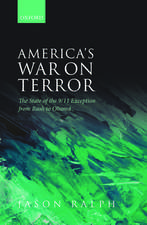Terrorism
Autor Kenneth Katzmanen Limba Engleză Paperback – 12 mai 2009
Preț: 300.98 lei
Preț vechi: 406.64 lei
-26% Nou
Puncte Express: 451
Preț estimativ în valută:
57.60€ • 59.91$ • 47.55£
57.60€ • 59.91$ • 47.55£
Carte disponibilă
Livrare economică 24 martie-07 aprilie
Preluare comenzi: 021 569.72.76
Specificații
ISBN-13: 9781606920497
ISBN-10: 1606920499
Pagini: 75
Dimensiuni: 154 x 227 x 7 mm
Greutate: 0.17 kg
Editura: Nova Science Publishers Inc
ISBN-10: 1606920499
Pagini: 75
Dimensiuni: 154 x 227 x 7 mm
Greutate: 0.17 kg
Editura: Nova Science Publishers Inc
Cuprins
Preface; Introduction; Radical Islamic Groups; Radical Jewish Groups: Kach and Kahane Chai.











